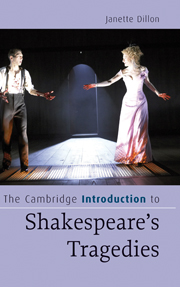Book contents
- Frontmatter
- Contents
- Acknowledgements
- Introduction
- Chapter 1 Tragedy before Shakespeare
- Chapter 2 Titus Andronicus
- Chapter 3 Romeo and Juliet
- Chapter 4 Julius Caesar
- Chapter 5 Hamlet
- Chapter 6 Othello
- Chapter 7 Timon of Athens
- Chapter 8 King Lear
- Chapter 9 Macbeth
- Chapter 10 Antony and Cleopatra
- Chapter 11 Coriolanus
- Notes
- Index
Chapter 6 - Othello
Published online by Cambridge University Press: 05 August 2015
- Frontmatter
- Contents
- Acknowledgements
- Introduction
- Chapter 1 Tragedy before Shakespeare
- Chapter 2 Titus Andronicus
- Chapter 3 Romeo and Juliet
- Chapter 4 Julius Caesar
- Chapter 5 Hamlet
- Chapter 6 Othello
- Chapter 7 Timon of Athens
- Chapter 8 King Lear
- Chapter 9 Macbeth
- Chapter 10 Antony and Cleopatra
- Chapter 11 Coriolanus
- Notes
- Index
Summary
Othello was probably first performed soon after King James VI of Scotland acceded to the English throne in 1603. James' accession meant a change in status for the Chamberlain's Men, who now became the King's Men, thereby acknowledged as the premier acting company in the country. Shakespeare's company performed on all the notable dates of the Christmas season 1603, by contrast with the previous year, when the dates were shared out fairly evenly between the companies. Othello was performed at court, at the Whitehall Banqueting House, on 1 November 1604. Like most of Shakespeare's plays, however, it was also performed in the public theatre in London and probably taken on tour. An eyewitness account of a performance at Oxford University in 1610 survives, giving us a brief and fascinating window into one contemporary response to the play.
In the last few days the King's players have been here. They acted with enormous applause to full houses … They had tragedies too which they acted with skill and decorum and in which some things, both speech and action, brought forth tears.
Moreover, that famous Desdemona killed before us by her husband, although she always acted her whole part supremely well, yet when she was killed she was even more moving, for when she fell back upon the bed she implored the pity of the spectators by her very face.
Letter by Henry Jackson, September 1610 (translated from the Latin)Clearly pity, classified by Aristotle, with fear, as one of the two emotions that tragedy should evoke (p. 2 above), is a central part of this spectator's response, and it is the actor's face, not the grander spectacle suggested by the surviving sketch and contemporary response to Titus Andronicus, that is indicated as prompting that response. A boy-actor here immerses a spectator in the role he plays, as opposed to impressing him with an awareness of the play as a performance.
- Type
- Chapter
- Information
- The Cambridge Introduction to Shakespeare's Tragedies , pp. 77 - 90Publisher: Cambridge University PressPrint publication year: 2007

